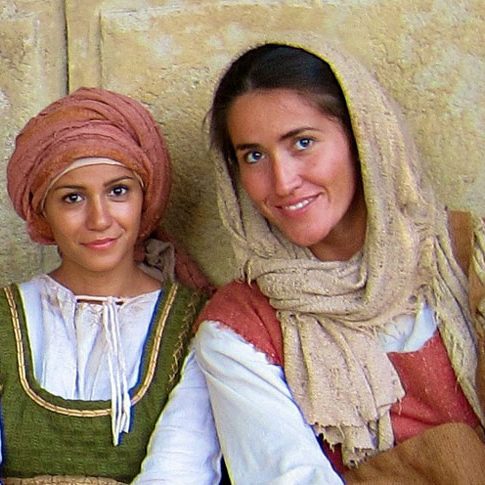
On Sunday I taught a lesson on Women in the Scriptures at our church. My goal with the lesson was to help the women learn how to recognize and relate to the women that are mentioned in the scriptures. Often times all we get is a name or a brief mention of a wife or daughter and nothing else about her, but by stopping and taking time to think and reflect often times I’ve found that I can learn much about a what she must have experienced, what her life might have been like, and what type of woman she was. I’ve also found that I’ve been able to relate or “liken” the scriptures to my own life as a woman better when I remember that almost EVERY story has a woman in it somewhere– whether we hear about her or not. For my lesson on Sunday I made a list of the questions that I ask myself every time I come across a new woman in the scriptures and I thought they might be helpful for others in their own personal scripture study.
1- What is unique about this woman and her story?
2- How does she fit into the time period in which she lived?
3- What Christlike qualities does she exemplify?
4- What would I ask her if I could meet her?
5- How can I relate to her?
6- What can I (or someone else I know) learn from her experiences?
Each woman’s story will mean something different to everyone and there is such power in being able to find your own answers and discoveries in the scriptures. I hope that these can help you, and other people you know, pay more attention to the women in the scriptures and not pass over a remarkable woman just because she is only mentioned as the a daughter, a widow, a wife or a child. Happy Scripture Studying!
Author: Heather Farrell
I am a scripture loving, book writing, baby snuggling, garden growing, faith-centered disciple, wife, mother, daughter, and sister.
I believe words have the power to change the future and heal the past.









Hi Heatherlady,
When I find the accounts of women in the scriptures I make sure and liken them to the church. If Christ is the Bridegroom then the Church is His bride. I find such telling symbolism about the Church when I use this rule to ponder on the role of the woman in the scriptures too.
BTW I love all the wonderful insights you give us into the women in the scriptures.
Hello, Heatherlady. I recently was visiting a friend and at breakfast on Sunday morning, I offered to say 'grace'. Her son (a Jehovah's Witness) and her male friend (a non-church attending Christian) both commented on my saying the prayer, stating that the bible says women must cover their heads to pray to God and that this is a man's right. Do you know if this is true and where in the bible it states this?
Loueen,
What an interesting experience you had! I think I am pretty sure I know what scripture they are refering to. It is 1 Corinthians 11: 1- 15. I won't put the whole text here (you can go read it) but here is the jist of what is says,
"But I would have you know, that the head of every man is Christ; and the ahead of the woman is the man; and the head of Christ is God.
4 Every man praying or prophesying, having his head covered, dishonoureth his head.
5 But every woman that prayeth or prophesieth with her head uncovered dishonoureth her head: for that is even all one as if she were shaven.
6 For if the woman be not covered, let her also be shorn: but if it be a shame for a woman to be shorn or shaven, let her be covered.
I think these are the scriptures they were referring to. You know I wish I could give you more insight into what they mean, but the truth is that I am a bit confused about them myself. I know that some Christan churches take these scriptures very seriously and women wear head coverings not only when praying but also daily. I know that Orthodox Jewish women also wear head coverings (wigs count)but Jewish men also cover their heads. I think it is interesting that your friends would bring up you praying without a covering as an issue. I'd love to know more about their thoughts and reasoning behind it.
I think you've given me a good research topic. These scriptures are confusing and contradict themselves, for example it says that in one place that "man is not of the woman, but the woman the man" and then a few versed down it says "For as the woman is of the man, even so is the man also by the woman". Confusing. I'll probably have to study this one out and write a blog post about it some time soon.
Thanks for the question!
I have thoroughly enjoyed this blog. It has given me great reason to ponder such question that I too have wondered about. It also gives me a good reason to further my studies of the scriptures. My personal opinion is that perhaps there is a combination of symbolism as well some aspects of culturally acceptable behavior at that particular time and in that region of the world. First Corinthians 11:15 says, "But if a woman have long hair, it is a glory to her: for her hair is given her for a covering." It certainly remains somewhat of a mystery. When it comes right down to it, prayer is a wonderful tool that has been given to all of us, so that we can communicate with Heavenly Father regardless of our gender.